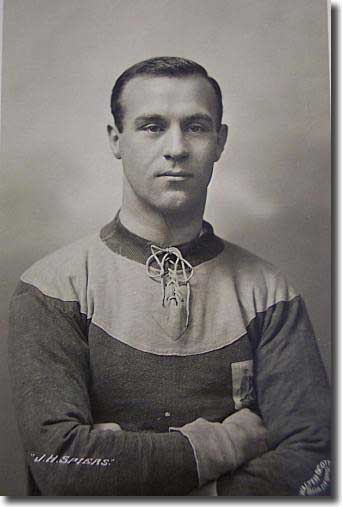 Part
1 Ravaged by war - Part 2 Ten years in the
making - Results and table
Part
1 Ravaged by war - Part 2 Ten years in the
making - Results and table
Leeds City Association Football Club had hoped that the 1914/15 season
would see them finally secure promotion into the First Division. But extreme
inconsistency through the autumn undermined those aspirations: City had
followed a 6-3 reverse at Birmingham on 24 October by turning over Grimsby
5-0 a week later; a 7-2 thrashing of
Leicester Fosse on 12 December was sandwiched between disappointing
losses at Nottingham Forest and Barnsley.
Beating struggling Glossop twice over the Christmas holiday period, however,
left the club at a season's high 13th position, looking to put together
a run that would see them scale the table.
They expected to continue their advance with an Elland Road fixture against
Stockport County on 2 January, but were sadly disappointed, as recounted
by JRB in his report of the game for the Leeds Mercury.
'The defeat of Leeds City by Stockport County must have been a big disappointment
to the majority of the seven thousand spectators who assembled at Elland
Road. It cannot be gainsaid that on the day's play the visitors were fully
entitled to both points, as they were quite as good as Leeds in attack
and certainly superior in defence.
'Their victory of three goals to one was not brought about by means of
really clever forward work, but owing to the weakness of the home backs.
They frequently let in the County forwards, who made the most of the mistakes
of Blackman and Affleck. The goal scored by Stockport after half an hour's
play was the result of an error on the part of Blackman, who let Lloyd
- a very good wing forward - get past him, to give the ball to Kenyon,
who scored. With this goal the visitors led at the interval, although
Leeds came near scoring on two occasions.
'Although the City managed to equalise about fifteen minutes after the
interval, Speirs heading in from a pass by Bainbridge, they never played
like a winning side, and appeared to be worn out at the conclusion of
the game. It is true that they came within an ace of scoring towards the
end when McLeod, with only Evans to beat, sent in a hard drive, which
the County custodian smartly saved, but with difficulty.
'Stockport's other two goals came in the last eight minutes, Rodgers
scoring from an accurately-placed centre by Proctor, who also took the
corner kick which enabled Graham to beat Hogg for the third time.
'The City forwards did well. At times they passed splendidly, while Sharpe
and McLeod sent in several good shots. They had to work hard to get past
Goodwin and Fagan, an admirable pair of backs, who played a big part in
the success of the visitors. In front of them were a good trio of halves,
who supported their forwards well. The same can be said of the home lot,
of whom Hampson was the pick. Law, who took the free kicks, narrowly missed
scoring on two occasions.'
Thus thwarted, City did not hold out much hope for their FA Cup first
round tie, away to Derby County on 9 January. The Rams were atop the Second
Division table and had gone fourteen matches without defeat since Leeds
beat them at the Baseball Ground on 10 October. That win was City's only
success away from Elland Road thus far and they had won just five of their
thirteen games since.
It was with a little trepidation, therefore, that the City party left
for the East Midlands.
back to top
The only change to the Leeds team was Harry Peart returning at centre-half
for the injured Jack Hampson and the eleven read as follows: Tony Hogg;
Fred Blackman, George Affleck; George
Law, Peart, Mick Foley; Simpson Bainbridge, John Jackson, Billy McLeod,
Jimmy Speirs (captain), Ivan Sharpe.
The Peacocks played a sound game, far better than their record suggested
they might, starting "in a quick and confident style", according to the
Yorkshire Post. Sharpe gave them a first half lead and though Fordham
equalised for Derby following a free kick, McLeod scored the winner towards
the end of the tie.
The victory was well deserved, though it was generally reported that
it was a case of County being poor rather than Leeds playing an outstanding
game. Nevertheless, it was a notable achievement and a rare Cup victory
for City.
When the Peacocks followed on a week later with an
astonishing 6-2 victory at Hull, McLeod contributing five goals, it
seemed that they had turned the corner. Incredibly, the erratic form that
had haunted the club continued unabated; City lost five games on the bounce,
the first four without troubling the scorers.
The first of those defeats, at Blackpool on 23 January, came courtesy
of a hotly disputed penalty eight minutes before the end of the first
half. Tommy Lamph retained his position at centre-half with Peart suspended
and Hampson injured, but conceded the spot kick after bringing down Blackpool
inside-right Green.
Herbert Chapman was absent from
the game, choosing instead to watch his old club Northampton play Queens
Park Rangers, City's opponents in the second round of the Cup the following
week.
The defeat at Blackpool was not the best preparation for facing a team
who were champions of the Southern League in 1908 and 1912 and had gone
unbeaten since the end of November. But memories of the first round victory
at Derby were still vivid and gave supporters hopes of another win. The
only team change saw Hampson restored after three games out with flu.
The City party travelled to London by train the day before the tie and
spent the evening at the Kings Cross Hotel.
City negotiated for the game to be played at Elland Road as both Chelsea
and Fulham were also playing at home, but their request was rejected by
Rangers.
Given the competition from the other games in West London, an attendance
of around 10,000 was as good as could be expected, and among them were
a number of Leeds soldiers attached to the Yorkshire Light Infantry, in
training at Whitley Common in Surrey. Though the day was fine, the pitch
was greasy and holding. Jimmy Speirs won the toss but there was little
wind and little advantage to be gained.
Rangers were committed to an aggressive pressing game and two free kicks
were awarded against them in as many minutes. The Londoners' right winger,
Thompson, had a couple of promising runs and sound defensive work was
required of first Hampson and then Blackman to deny him.
Bainbridge led the first City attack and Rangers keeper MacLeod had to
be smart to block a Speirs header and then a hard drive by the same player.
City came close to scoring from a well-placed corner by Bainbridge but
MacLeod saved a header from his Leeds namesake before Bainbridge hammered
the loose ball wide.
Rangers responded powerfully and when one fierce drive came in from Birch
it was only denied by a City defender throwing 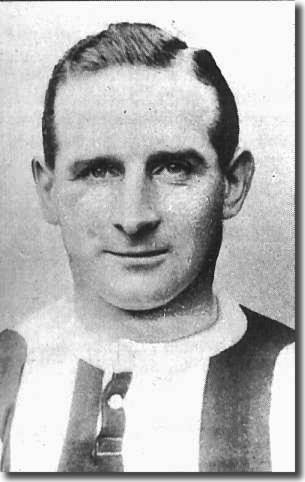 his
body fearlessly into its path.
his
body fearlessly into its path.
At the other end, Billy McLeod beat a number of defenders before feeding
Jackson, but the inside-forward had little room to fashion a shooting
opportunity for himself.
A closely-fought contest reached the interval without a goal, but Rangers
pressed hard at the start of the second half, with Leeds showing the effects
of the first half pace and the heavy pitch. Hogg was brilliant in saving
from Donald and Mitchell, at one stage diving at the ball and then flicking
it clear as he lay sprawled on the ground. Blackman was cautioned by the
referee for bringing down Miller on the edge of the area.
Seven minutes after the resumption, Hogg's goal was pierced. Affleck
misjudged his kick and gave Broster and Thompson the chance to break down
the right. Thompson fired across the face of goal and inside-left Simons
registered an easy score. There were protests that Simons was offside,
but the referee dismissed the claims.
back to top
Rangers continued to attack and Affleck, Hampson and Blackman were forced
to concede corners before Hogg was injured and required treatment following
one save.
Yorkist in the Leeds Mercury: 'With only fifteen minutes left
for play, Leeds City rallied in remarkable fashion. Twice in rapid succession
the Rangers custodian was almost beaten. Then City forced a corner, and
immediately following this McLeod and Jackson appeared certain to score
between them. McLeod was in the act of shooting when one of the Rangers
backs, who had fallen, held McLeod as in a vice with his legs, and the
Rangers custodian was able to clear. Had the referee noticed the incident
he must have awarded a penalty. Then Jackson was nearly through again,
the Rangers custodian saving with a crowd of players on top of him.
'Try as they would, the City could not get the ball in the net, and it
was a great relief to the crowd when the whistle went for time.
'The two outstanding men on the Leeds City side were Hogg and Hampson.
Hogg gave a remarkably fine display of goalkeeping, and he came through
a very trying time in the second half with distinct credit. Blackman and
Affleck were not quite as sound as usual at back. They made few serious
mistakes, however, and it was distinctly hard luck on Affleck that one
of his few errors should have cost his side so dearly. Apart from that
mistake, his work was good.
'Hampson distinguished himself at centre-half, and his display was all
the more noteworthy because of the fact that it was his first appearance
after the illness which kept him out of the team since the Stockport County
match on January 4th. He was the best half-back on the field. Law was
a good second to him, and Foley, of less prominence than the other two,
also worked hard.
'The forwards were good in the first half and in the last quarter of
an hour Speirs, McLeod and Jackson were the pick. Bainbridge made the
most of his chances, but most of the play was on the other wing. Ivan
Sharpe was not allowed much time, however, as he was well watched.'
City lost a midweek match at home to Clapton Orient thanks to a breakaway
goal five minutes before half time. Hogg caught a centre but his clearance
fell to Orient centre-forward Jonas, who scored easily.
The Londoners were on defence for most of the game and were lucky not
to concede when City were awarded a penalty in the first ten minutes.
Sharpe drove the kick straight at the goalkeeper. Shortly afterwards McLeod
headed against the bar and Speirs then went close with two headers.
'On the run of the play they ought easily to have won,' reported the
Yorkshire Post. 'In the second half quite four fifths of the play
again ran in the City's favour, but score they could not.'
The Peacocks' misery was compounded when McLeod suffered a ricked back
and finished the game a limping passenger on the right wing.
The centre-forward was an absentee when City visited Highbury on 6 February
to play The Arsenal. The Leeds line up showed a host of changes with Herbert
Chapman resting a number of players who required a break. John Edmondson
was given his debut in McLeod's stead, as was goalkeeper Willis Walker
as replacement for Tony Hogg. Jack
McQuillan made his first appearance since the middle of November,
taking the place of Fred Blackman, while John Jackson ousted Simpson Bainbridge
on the right wing.
The turf was 'simply not fit for serious football', according to the
Yorkshire Post. 'The greater part of the playing pitch was ankle
deep in mud. It was gravely stated that the condition of the ground was
not as bad as it had previously been for some weeks;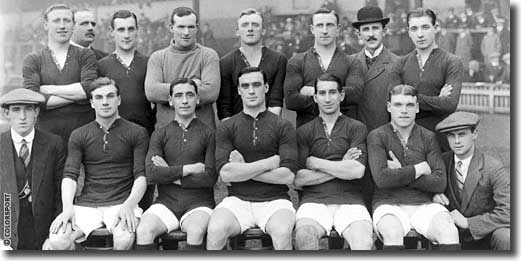 hence the advantage of acquaintance with it by the home side will be obvious.
hence the advantage of acquaintance with it by the home side will be obvious.
'As it was, the game was well and closely contested, and the City on
the general play deserved at least to share the points. They had rather
the worse of the play in the first half, but were the more aggressive
side afterwards, and only the splendid goalkeeping of Lievesley, combined
with examples of really bad luck, prevented them from scoring.
'The Arsenal scored the two goals of the match in the first half, one
after twenty minutes' play and the other just before the interval. Rutherford
was the scorer in the first instance, and he also initiated the movement
that led to the second goal. He had just had a hard, direct shot excellently
parried by Walker in the City goal and then sent across a left leg drive,
which was obviously intended for a centre, but the ball curled in and
found the far corner of the net. Walker was taken by surprise, and fell
before he could reach the ball.
'In the other case Rutherford made a fast run and centre, and Bradshaw
was allowed to score more easily than he should have done, for Walker
did not anticipate the shot, and again stumbled in trying to save it.
The Arsenal goal had narrow escapes from shots by Edmondson and headers
by Speirs, and it was generally acknowledged that Leeds did not deserve
to be two goals behind at half-time.
'In the second half the City showed the better stamina and were triers
to the last minute. Their own goal was several times assailed, but without
falling, Walker saving some good shots, and Law, Hampson, Affleck and
McQuillan showing good defence. Flanagan and Bradshaw caused them the
most trouble. On the other hand, the City attacked hotly, especially in
the last twenty minutes, and Edmondson found his best shots splendidly
dealt with by Lievesley, who can still claim to be as good a goalkeeper
as he was at Sheffield. Twice, however, he was lucky in having shots cannon
harmlessly off him when he had fairly been beaten.'
back to top
The 2-0 defeat was disappointing after such a splendid performance, but
was not unexpected against a team who moved into second place in the table
as a consequence. The following weekend brought no respite, for the visitors
to Elland Road were table topping Derby County, eager to gain revenge
for the two defeats they had suffered at home to City earlier in the campaign.
Walker and Edmondson retained their places, though Billy McLeod was recalled,
playing inside-right; Harry Peart deputised for Jack Hampson, excused
service on compassionate grounds after the death of his father during
the week.
Yorkist in the Leeds Mercury: 'It was only in accord with the
many curious results of 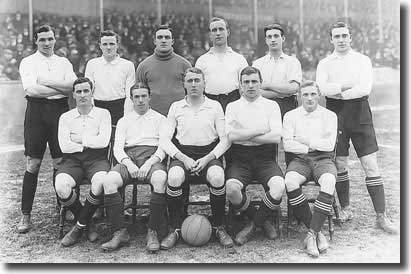 football
this season that Leeds City should be beaten at home by Derby County.
The Elland Road representatives astonished the football world by winning
at Derby in October by the odd goal in three, and they repeated the performance
in the first round of the Cup competition, these being the only occasions
Derby County have failed on their own ground this season. Their victory
by 5-3 at Elland Road on Saturday was a fair measure of revenge.
football
this season that Leeds City should be beaten at home by Derby County.
The Elland Road representatives astonished the football world by winning
at Derby in October by the odd goal in three, and they repeated the performance
in the first round of the Cup competition, these being the only occasions
Derby County have failed on their own ground this season. Their victory
by 5-3 at Elland Road on Saturday was a fair measure of revenge.
'The match was altogether a disastrous one for Leeds City. It had promised
to be one of the most attractive of the season, but it was ruined by the
blizzard. It was surprising that as many as four thousand people had the
courage to turn out in such shocking weather, but the majority of them
were under shelter in the stands.
'The players had a gruelling time of it. The ground was little better
than a lake of mud, while rain and sleet, driven by a chilling breeze,
fell practically throughout the ninety minutes. One or two of the players
were scarcely fit to turn out in the second half, so severely had they
been buffeted by the storm.
'In spite of all this, however, quite an interesting game was served
up. There were naturally numerous mistakes, and it was the mistakes of
Leeds City which contributed to their defeat more than the cleverness
of Derby County. Leeds City undoubtedly had the better of the play for
the greater part of the game, but mistakes on the part of their defence
cost them four of the five goals recorded by Derby County and that was
how the visitors succeeded.
'Only twice in the first ten minutes of the game did Derby County become
dangerous, but on each occasion they were virtually presented with a goal.
On the first occasion both Peart and Blackman missed the ball and Moore,
the County inside-left, got away with a clear course, and scored from
short range. A similar mistake by Affleck led to Derby's second goal,
Leonard, the County centre-forward, also getting a clear course. Walker
came out to meet him, but Leonard drove the ball past the custodian and
it went into the net from the crossbar.
'It looked as if City were in for a severe beating, but the players never
lost heart and were invariably hovering in the vicinity of the County
goal. Speirs made a bad mess of one great chance, but City nevertheless
succeeded in drawing level two minutes before the interval. Their first
goal was the best of the match. Foley sent Price away on the right and
Price flashed the ball into the centre, where it was met by Edmondson
running at top speed. Without hesitation Edmondson let drive with a terrific
rising shot, the ball crashing against the underside of the crossbar and
going through.
'Edmondson was nearly in again a minute later. He forced a corner, and
this led to the equaliser. George Law took the kick instead of Price and
placed the ball so well that Speirs headed past Lawrence, the custodian
getting his hand to the ball, but failing to hold it. The enthusiasm of
the crowd was naturally great at these successes, but their joy was quickly
damped, for two minutes later Walker, the young City custodian, let a
simple shot from Moore slip through his hands. Thus the County led by
the odd goal in five at the interval.
'Only six minutes of the second half had elapsed when Walker again caused
consternation in the City camp by allowing a long ground shot from Baker,
the County outside-left, to again slip through his hands. City nevertheless
continued to play up pluckily and Lawrence was frequently tested, but
refused to be beaten.
'The issue was placed out of doubt eight minutes from the end, when Derby
County scored again, Leonard getting a good goal at close range from a
centre by Baker. City got a curious goal in the last minute, during a
scrimmage, the ball cannoning off Sharpe's arm into the net. The Derby
players appealed for a free kick, but Mr Pearson allowed a goal, a very
questionable decision.
'One of the disappointing features of the match was that Walker, the
young county cricketer, should fail to do himself justice in the City
goal in his first big match before the home crowd. He had shaped well
on the occasion of his League debut in the match against The Arsenal at
Highbury on the previous Saturday, but he must now have been seized with
a bad attack of nerves.
'It may be that he was upset by the two early goals scored by Derby County,
for which he was in no way to blame; 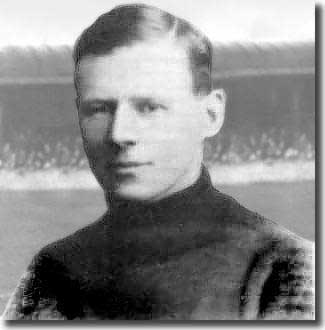 but,
no doubt, he is still marvelling to himself how he missed stopping the
shots which secured the third and fourth goal. With a little more experience,
however, I feel convinced that Walker will make a first rate custodian.
but,
no doubt, he is still marvelling to himself how he missed stopping the
shots which secured the third and fourth goal. With a little more experience,
however, I feel convinced that Walker will make a first rate custodian.
'The experiment of playing Price and McLeod on the right wing was not
quite a success, as neither player was at his best, though Price had a
share in the first goal. Edmondson, the young centre-forward, shaped well
and that great opening goal he scored stamped him as an opportunist. He
looks like making a name for himself. Speirs and Sharpe were clever on
the left wing.'
back to top
Undeterred by the defeat, the fifth in succession, which left them seventeenth
in the table, City came back to form a week later, winning 1-0 at Lincoln
City.
The home team were unbeaten since November, but the Peacocks outclassed
them. Hampson and Jackson were restored to the team and Ernie Goodwin
returned for his first appearance since the end of November, though he
was now on the right flank.
The Yorkshire Post reported that Leeds 'were not so frequently
in front of goal as their opponents, but there was more polish about their
methods, and Butler, the home custodian, had more dangerous shots to negotiate
than Walker'.
Sharpe was the most threatening of the Leeds forwards and early on the
Lincoln keeper was relieved to concede a corner after saving a shot from
the amateur.
Leeds took the lead after seven minutes. Edmondson capitalised on Goodwin's
cross to fire home the opening goal, which turned out to be the only score
of the afternoon.
Lincoln fought hard to get back on terms and Egerton shot against the
bar with Walker beaten; the same player rounded the keeper before losing
possession and seeing Blackman clear.
Just before the interval, Edmondson netted again after getting past the
Lincoln custodian but saw his effort ruled out for offside.
The Peacocks' defence was resolute in the second half and successfully
kept out the Lincoln forward line to secure a much needed victory.
City built on that success by beating Birmingham 2-0 at Elland Road on
27 February with goals from Jackson and Price. It was a notable achievement
for the Midlanders were pressing hard for promotion.
In the week that followed, Leeds City tendered the club's resignation
from the Midland League so that the reserve team could play instead in
the more suitable Central League competition. They successfully applied
for admission two months later and in accordance with regulations Herbert
Chapman resigned from the Central League management committee.
On 6 March a City team unchanged for the third successive game triumphed
by 5-2 at Grimsby.
Cestus in the Leeds Mercury: 'Leeds City recorded a great success
at Grimsby, when they claimed five of the seven goals scored in a game
which was quite one of the most exciting seen at Blundell Park this winter.
'On the run of the play Leeds City were fortunate to win by so decisive
a margin, for Grimsby did much more attacking than the visitors, and the
success was due primarily to a wonderful display of goalkeeping by Walker
- who must have broken the hearts of the Town attackers by the uncanny
manner in which he seemed to anticipate the strength and angle of their
shots - and by the power of the forwards to keep their heads and shoot
with judgement when chances did come their way.
'To say that Grimsby did three fourths of the forcing work is but to
give them their due, but their work, though fiercely energetic at times,
was deficient in style and polish. At close quarters, too, they lacked
confidence. Walker was given opportunities to save balls which, had the
opening been used properly, he never ought to have had a chance with.
Still that was Grimsby's look out. The custodian made no mistake if the
attackers did.
'In striking contrast was the finishing power of the Leeds raiders. They
may have advanced to Grimsby's end a dozen times in the course of the
game - certainly not more - and yet they made five goals! The shooting
was quite deadly. One could not wish to see anything more workmanlike
than the first time shots with which Jackson and Sharpe scored their respective
goals, while as every forward in the line helped himself to a point it
is obvious that every man was equal to opportunity when it waited upon
him.
'Sharpe and Price were the better wing. The amateur was much too speedy
for the Town defenders. Edmondson was seen to advantage as a distributor
in the first half, but he sustained a kick which caused him to limp, and
to be subdued in the second stage. Jackson was always good, while Goodwin
showed ability to keep his head cool and his feet busy when a mistake
by Arrowsmith allowed him to cut in for goal and score.
back to top
'The middle men were a sounder trio than the home line. Foley was the
cleverest, but Hampson was a great worker. Blackman was the better back,
but the outstanding man of the defence was Walker.'
A week later a 1-0 victory over Huddersfield courtesy of a goal from
Ivan Sharpe took City up to a season's high of twelfth place, ten points
clear of the re-election zone and getting close to securing their Second
Division status.
A crowd of 12,000, the highest at Elland Road all season, witnessed a
lacklustre game in which Huddersfield rarely threatened a goal. City were
not much better, though they did dominate possession. The Terriers defence
performed admirably in difficult circumstances and denied the Leeds forwards
on a number of occasions.
The Peacocks gave a better performance at Bristol City on 20 March, but
were defeated by a single goal, scored right at the end of the first half.
The Yorkshire Post claimed that 'a draw would better have represented
the play, for the visitors were quite as good a side as Bristol though
fortune did not befriend 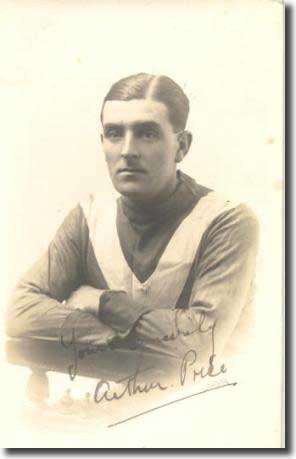 their
scoring efforts.'
their
scoring efforts.'
Goals from McLeod and Price were enough to secure a 2-1 victory at Elland
Road against Bury on 27 March, with all the goals coming in the first
half hour of the game. The victory all but guaranteed City would retain
their Second Division status, though one more point was needed to be mathematically
assured.
That left City with little to play for in their remaining six games and
there was little surprise when they lost 2-0 at second-placed Preston
on 3 April. Nevertheless they started the game well and should have taken
the lead in the first fifteen minutes, but Sharpe sent the ball over the
bar when faced with an open goal. Preston opened the scoring three minutes
later, but had to wait until the closing minutes before adding to their
score.
That same afternoon, a startling 5-4 victory by Leicester Fosse against
Stockport County meant that the Fosse retained the slimmest of chances
of catching Leeds, but when the East Midlanders lost 1-0 at Derby County
two days later the result confirmed City's Second Division future.
It was just as well, for the Peacocks were hammered 5-1 at Wolverhampton
that day. Twenty-four hours later the same two teams met at Elland Road
and the Wanderers emerged victorious once more, but it was a rather closer
affair with Leeds going down by the odd goal in five.
Further evidencing their chronic inconsistency, City snapped back to
winning ways with an emphatic 4-0 defeat of Nottingham Forest on 10 April
after three successive defeats.
Arthur Price scored three of the goals, the first after just eight minutes
with a low drive. He added his second in similar style midway through
the first half and completed his hat trick five minutes after the break.
Ivan Sharpe scored a fourth, atoning for some wayward shooting earlier
in the contest. The victory could have been even greater: George Law saw
his penalty saved by Forest keeper Powell.
Inevitably, a tremendous win was followed by just as one-sided a reverse
the following week, with Leicester earning revenge for their 7-2 defeat
at Elland Road in December by hammering City 5-1.
JTS in the Mercury: 'It was a very remarkable game, in which a
team of far greater talent and football ability was hopelessly outclassed
by what would be an inferior side under anything like ordinary conditions.
The Fosse team as a whole is a very light one and the forwards, in consequence
of their lack of stamina, are generally no match for a side of greater
weight, especially when the turf is damp and holding. But on Saturday
the conditions were not those which generally prevail at football. The
ground was hard, fast and true, but at the same time no one imagined that
this factor would prove so great a drawback to a side of the speed and
resource of Leeds City.
'The crack was a sudden and deep one, for after twenty minutes' play,
the Fosse began to make rings round the City defence, so that Walker in
goal had quite a lot of very hard work to do. The City goalkeeper, too,
seemed to be upset by the rapidity with which the attacks were developed,
and the fast drives which were fired at him from all angles. Then he fell
into temptation.
back to top
'A Fosse forward centred the ball into that zone of danger which lies
behind the backs, and yet well in front of the goalkeeper. Walker went
for the ball, but as he was on his journey, the ball was popped over his
head into the tenantless goal. Then Walker failed to hold a low, fast
drive from Douglas, and the ball passed between his legs for goal number
two. A minute or two later King walked past with the ball as Walker lay
prone on the ground. These three goals were scored in six minutes.
'Leeds could not get going, and their fancy movements, their openings,
and all the other ornamental drapery were of no avail on a hard, true
surface. Before half time Leicester added yet another goal, and as Leeds
could not score on their own, one of the Leicester backs presented them
with a goal by deflecting the ball against one of the uprights. At the
interval the score was 4 to 1 in favour of the home side.
'In the second half Leeds City could do nothing right; they hit the crossbar
often, and forced many corners all in vain. The Fosse, on the other hand,
added yet another to their substantial total. That is the story of a very
remarkable match.'
City completed their campaign on 24 April with a drab 2-0 defeat at home
to Barnsley. The South Yorkshire team were always the masters on the day,
with Willis Walker earning a man of the match rating for his goalkeeping
display, denying Barnsley an even higher score.
Joe Green, a local recruit, was given
his debut at left-back, and he was culpable for the first goal after five
minutes. In attempting to clear a low drive from Lees, Green saw his kick
charged down by Fletcher, and the ball rebounded into the net.
That setback knocked the stuffing out of City and they rarely looked
like getting back on terms, 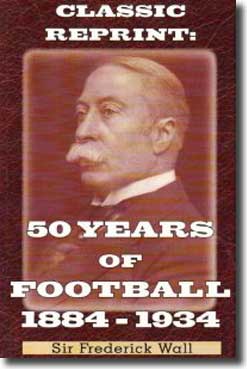 conceding
again on the half hour. They rallied a little in the second half but were
always the inferior side, seeing out a disappointing season with a feeble
whimper.
conceding
again on the half hour. They rallied a little in the second half but were
always the inferior side, seeing out a disappointing season with a feeble
whimper.
On a positive note, Billy McLeod's 18 League goals made him the club's
leading goalscorer for the ninth successive season since joining City
from Lincoln, a tribute to the centre-forward's astonishing consistency.
His record in the League for City now stood at 163 goals from 281 appearances,
with a further six goals in 12 Cup games.
Leeds finished fifteenth, victims of the appalling inconsistency that
had dogged them all year. The onset of war had left little incentive for
the winning of promotion, as it was almost certainly going to be the final
season of normal competitive football. This brought with it plummeting
attendances and a consequent lack of atmosphere.
In March, the Football Association decreed that no wages were to be paid
to professional footballers between May and July, and that the maximum
weekly wage was reduced from £4 to £3. A transfer embargo was put in place
until August.
In April, FA secretary Fred Wall revealed there was unlikely to be any
Cup-ties or League matches played in 1915/16, basing his conclusions on
the action of the FA Council in deciding to defer consideration of dates
for Cup competitions and international matches and agreeing that the future
action of the Council should be guided by developments in the War.
Wall added that in 1914 there had been large financial barriers to such
an action as contracts had been made with players, landlords and building
contractors, involving about £750,000. This rendered any suspension of
games in 1914/15 impossible, the war coming so unexpectedly in August,
after all arrangements had been finalised.
Although competitive games only normally began in September, the engagement
of players was effective from May. For 1915/16 matters would be different:
no agreements with players would be countenanced.
There was consequently little to look forward to that spring for Leeds
City, as outlined by the Yorkshire Evening Post towards the end of April:
"The end of a very unsatisfactory football season will find practically
every League club in the Football Association and the Northern Rugby League
much worse off financially than it was at the beginning of the season.
Leeds City, Hunslet and Bramley have all been on the parish, in other
words they have found it necessary to apply to the League Relief Fund
for assistance. Leeds City have indeed found it very difficult to continue,
and now that their season has ended it is a matter of great concern for
the Receiver for the debenture holders (Mr
Tom Coombs) and the directors how to keep the club afloat until another
period of activity comes along after the War."
That particular problem was to be eased a few months later, but Elland
Road in the summer of 1915 was a very depressed environment.
Part 1 Ravaged by war - Part
2 Ten years in the making - Results and
table
back to top












 Part
1 Ravaged by war - Part 2 Ten years in the
making - Results and table
Part
1 Ravaged by war - Part 2 Ten years in the
making - Results and table  his
body fearlessly into its path.
his
body fearlessly into its path. hence the advantage of acquaintance with it by the home side will be obvious.
hence the advantage of acquaintance with it by the home side will be obvious. football
this season that Leeds City should be beaten at home by Derby County.
The Elland Road representatives astonished the football world by winning
at Derby in October by the odd goal in three, and they repeated the performance
in the first round of the Cup competition, these being the only occasions
Derby County have failed on their own ground this season. Their victory
by 5-3 at Elland Road on Saturday was a fair measure of revenge.
football
this season that Leeds City should be beaten at home by Derby County.
The Elland Road representatives astonished the football world by winning
at Derby in October by the odd goal in three, and they repeated the performance
in the first round of the Cup competition, these being the only occasions
Derby County have failed on their own ground this season. Their victory
by 5-3 at Elland Road on Saturday was a fair measure of revenge. but,
no doubt, he is still marvelling to himself how he missed stopping the
shots which secured the third and fourth goal. With a little more experience,
however, I feel convinced that Walker will make a first rate custodian.
but,
no doubt, he is still marvelling to himself how he missed stopping the
shots which secured the third and fourth goal. With a little more experience,
however, I feel convinced that Walker will make a first rate custodian. their
scoring efforts.'
their
scoring efforts.' conceding
again on the half hour. They rallied a little in the second half but were
always the inferior side, seeing out a disappointing season with a feeble
whimper.
conceding
again on the half hour. They rallied a little in the second half but were
always the inferior side, seeing out a disappointing season with a feeble
whimper.